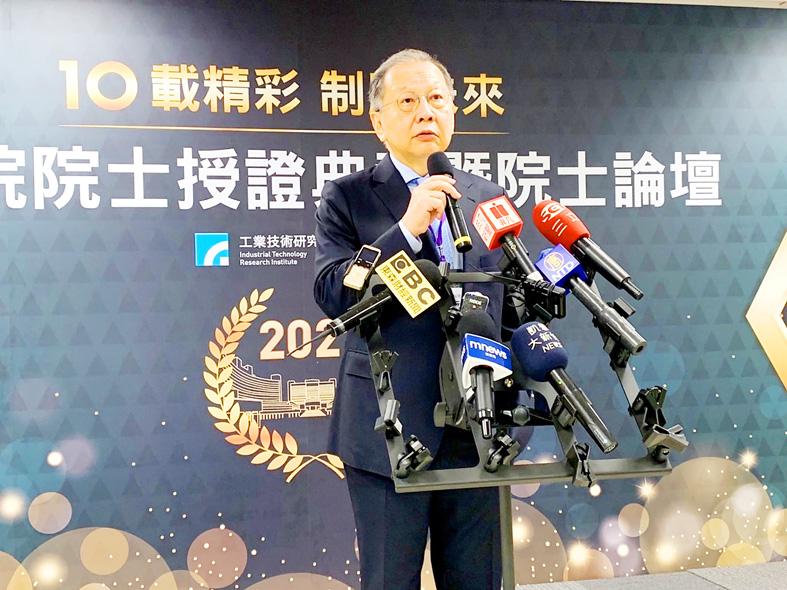MediaTek Inc (聯發科) yesterday said it would adopt next-generation 3-nanometer technology developed by Taiwan Semiconductor Manufacturing Co (TSMC, 台積電) for its new chips in a bid to consolidate its competitive edge.
The Hsinchu-based chip designer’s remarks came after speculation that Apple Inc might stick to 5-nanometer, rather than adopting TSMC’s 3-nanometer technology for its new iPhone series next year, due to unknown production problems.
TSMC has said that it is on track to increase production of 3-nanometer chips in the second half of next year.

Photo: Vanessa Cho, Taipei Times
MediaTek’s strategy is to enhance its competitiveness by collaborating with its major foundry partner, TSMC, a company executive said.
“We are not going to veer in a different direction... It is something we must do [to hold off the] competition,” MediaTek vice chairman and chief executive officer Rick Tsai (蔡力行) told a media briefing in Taipei.
“We have tapped 5-nanometer and 4-nanometer technologies to make our products. We think that 3-nanometer will certainly be next. We are working closely with TSMC,” Tsai said, declining to disclose a timeline.
MediaTek would further their cooperation by shifting to TSMC’s advanced chip packaging technology, dubbed chiplet, from existing 3D chip packaging technology.
Commenting on the lingering global chip shortage, Tsai said that supply next year would remain tight.
Tsai said that he does not expect to gain a clear picture of the supply-demand dynamics until 2023, when the world’s major foundries significantly ramp up new production.
For MediaTek, chip scarcity has been “manageable, but for the industry as a whole, it is a grave issue,” he said.
MediaTek last month told investors that it had a sufficient supply of chips to meet its business needs next year.
Given the company’s strong growth in 5G chips, Tsai said that MediaTek would be interested in using chips made at TSMC’s planned Kaohsiung factory.
TSMC’s board of directors approved the capacity expansion plan last week.
“The 5G market is growing beyond China next year, which will create a good opportunity for the company,” Tsai said.
MediaTek said that it expects to capture more than 35 percent of the Android-based smartphone market in North America.
The global 5G penetration rate next year is expected to exceed 50 percent, up from 30 percent this year, MediaTek added.

TAKING STOCK: A Taiwanese cookware firm in Vietnam urged customers to assess inventory or place orders early so shipments can reach the US while tariffs are paused Taiwanese businesses in Vietnam are exploring alternatives after the White House imposed a 46 percent import duty on Vietnamese goods, following US President Donald Trump’s announcement of “reciprocal” tariffs on the US’ trading partners. Lo Shih-liang (羅世良), chairman of Brico Industry Co (裕茂工業), a Taiwanese company that manufactures cast iron cookware and stove components in Vietnam, said that more than 40 percent of his business was tied to the US market, describing the constant US policy shifts as an emotional roller coaster. “I work during the day and stay up all night watching the news. I’ve been following US news until 3am

Six years ago, LVMH’s billionaire CEO Bernard Arnault and US President Donald Trump cut the blue ribbon on a factory in rural Texas that would make designer handbags for Louis Vuitton, one of the world’s best-known luxury brands. However, since the high-profile opening, the factory has faced a host of problems limiting production, 11 former Louis Vuitton employees said. The site has consistently ranked among the worst-performing for Louis Vuitton globally, “significantly” underperforming other facilities, said three former Louis Vuitton workers and a senior industry source, who cited internal rankings shared with staff. The plant’s problems — which have not

TARIFF CONCERNS: The chipmaker cited global uncertainty from US tariffs and a weakening economic outlook, but said its Singapore expansion remains on track Vanguard International Semiconductor Corp (世界先進), a foundry service provider specializing in producing power management and display driver chips, yesterday withdrew its full-year revenue projection of moderate growth for this year, as escalating US tariff tensions raised uncertainty and concern about a potential economic recession. The Hsinchu-based chipmaker in February said revenues this year would grow mildly from last year based on improving supply chain inventory levels and market demand. At the time, it also anticipated gradual quarter revenue growth. However, the US’ sweeping tariff policy has upended the industry’s supply chains and weakened economic prospects for the world economy, it said. “Now

COLLABORATION: Given Taiwan’s key position in global supply chains, the US firm is discussing strategies with local partners and clients to deal with global uncertainties Advanced Micro Devices Inc (AMD) yesterday said it is meeting with local ecosystem partners, including Taiwan Semiconductor Manufacturing Co (TSMC, 台積電), to discuss strategies, including long-term manufacturing, to navigate uncertainties such as US tariffs, as Taiwan occupies an important position in global supply chains. AMD chief executive officer Lisa Su (蘇姿丰) told reporters that Taiwan is an important part of the chip designer’s ecosystem and she is discussing with partners and customers in Taiwan to forge strong collaborations on different areas during this critical period. AMD has just become the first artificial-intelligence (AI) server chip customer of TSMC to utilize its advanced